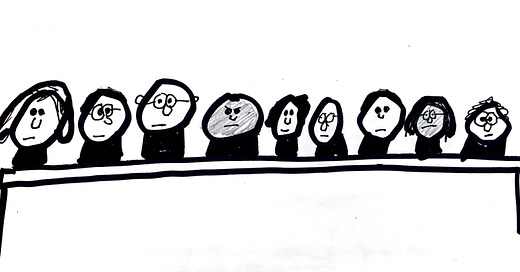Andrew Jackson allegedly defied the Supreme Court in 1832 over a case called Worcester v. Georgia, involving Georgia's attempt to apply state laws to Cherokee lands. As the story goes, Jackson announced “John Marshall has made his decision now let him enforce it.” Whether Jackson actually said this is disputed, but it illustrates a fundamental truth about the Supreme Court: It has no power to enforce its decisions. Alexander Hamilton called it the “least dangerous branch” because it has neither the “purse” of Congress nor the “sword” of the President.
So what does it have? Nothing but public trust. That trust is now eroding — faster and more dangerously for the Court’s future than at any time in its history. The Supreme Court confronts a profound crisis of legitimacy.
Consider:
1. After several days of hearings last week on the confirmation of Judge Ketanji Brown Jackson, Republicans on the Judiciary Committee made it clear they had no interest in knowing anything about her, but only making false charges and smearing her with innuendo. Her credentials are impeccable, but their relentless and baseless attack on Jackson’s sentencing in child pornography cases demeaned her — and further eroded the Supreme Court’s standing and integrity. (Although Judge Jackson appears certain to win Senate confirmation, almost all of the Senate’s 50 Republicans will vote against her.)
2. Then came the news that Virginia Thomas, wife of Clarence Thomas, had been actively engaged in trying to overturn the outcome of the 2020 election, including being present at the Trump rally immediately preceding the assault on the U.S. Capitol and sending numerous emails to Mark Meadows, then Trump’s Chief of Staff, urging him to find ways to reverse the election. Yet without recusing himself or revealing his wife’s activities, Thomas was the only justice to dissent in the Supreme Court’s decision in January to reject Trump’s request to block documents from being released to the House select committee investigating the January 6 insurrection.
3. The Court’s legitimacy was already under a cloud because of Trump’s and Mitch McConnell’s relentless packing of it. Starting with the blockade of Merrick Garland’s nomination in 2016 and culminating in the rushed confirmation of Amy Coney Barrett just days before the 2020 election, Republicans have signaled that partisanship is at the heart of the court’s decision-making. (Not to forget the right-wing justices who cut off the Florida recount and handed the 2000 presidential election to George W. Bush and the right-wing justices who effectively nullified the Voting Rights Act after Congress voted nearly unanimously to renew it.)
All this worries me on several levels. I know the Supreme Court. (I’m fortunate enough to have argued cases before it. I also clerked for the chief judge of the First Circuit, several of whose decisions went to the Supreme Court.) The Supreme Court can be, and has been, a remarkable institution for the public good. America needs a Supreme Court that can be trusted to make difficult decisions — especially when it comes to protecting the rights of individuals and minorities. The political branches cannot do this because at best they reflect the will of the majority, at worst they reflect the will of the wealthy and powerful.
Yet the Court can protect the powerless in our society only if it is trusted by most Americans. When in 1954 the Supreme Court decided that racially segregated schools violated the constitutional rights of Black children, many Americans were outraged. They ultimately came around, in part because of the trusted role the Court held in American society. When in 2015 the Court narrowly ruled that the Constitution guarantees a right to same-sex marriage, it also faced blowback. Yet here again, its decision was considered the law of the land.
The only person with the stature and responsibility to rescue the Court from its current death spiral is its chief justice, John Roberts. (Those who claim a chief justice doesn’t have power over his colleagues doesn’t understand the Court. A chief has the power to assign the writing of decisions in cases where he’s in the majority. He also has power over countless perks. And he has the informal authority to speak for the Court with the political branches and, unofficially, with the media.)
Roberts must do four things:
1. Push the Court to accept a code of ethics similar to the code now governing the lower federal courts.
2. Ask Clarence Thomas to recuse himself from all further cases involving Donald Trump or the January 6 attack on the Capitol.
3. Become an outspoken public advocate of the Court’s impartiality and a critic of those who would use it for partisan ends.
4. Openly and clearly ask the Senate to conduct confirmation hearings in ways that respect the impartiality and integrity of the Court.
In September 2005, I testified against Roberts’ confirmation to be chief justice because I was not convinced he would adequately protect the Court’s integrity. As I noted then — I’ve included a clip below — Roberts had told the Judiciary Committee that he would side with the powerful (the “big guy”) when the Constitution told him to and with the weak (the “small guy”) when the Constitution told him to. But the Constitution says nothing about protecting the powerful. It is entirely about protecting the rights of individuals and minorities from the powerful.
The Court will not die. But unless Roberts responds adequately to the current crisis of legitimacy, it will be reduced to becoming yet another instrument by which the wealthy and powerful entrench themselves — another casualty of the vicious and divisive era in which we are living.






















Share this post